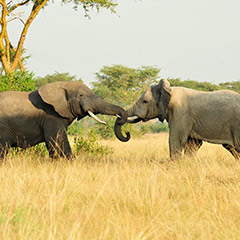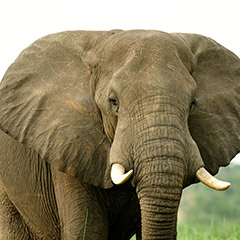
U.S. Fish and Wildlife Respository's confiscated wildlife items

U.S. Fish and Wildlife Respository's confiscated wildlife items
Wildlife trafficking is an escalating global crisis fueled in part by the U.S. ivory market – one of the largest globally.
A rhino is killed for its horns every nine hours in South Africa, and approximately 96 elephants are slaughtered for their tusks daily—that’s one every 15 minutes. In fact, if poaching continues at the current rate, scientists estimate some African elephant populations will be extinct within the next few decades. All five rhino species are already endangered, with some species on the brink of extinction.
The wildlife trafficking business has become so widespread that 37 countries and hundreds of organizations, including Zoo New England, have joined together to stop the killing, stop the trafficking and stop the demand for ivory.
Zoo New England supports the Wildlife Conservation Society's efforts to protect these vanishing species. WCS is steadily bolstering methods of protection, including ivory-sensitive sniffer dogs, radio-collaring, high-tech field tools, helicopter surveillance, and highly trained ecoguards.
How you can help
First, educate ourselves, your children, your neighbors. Bring the cause to the attention of your Massachusetts legislature, where legislation to ban the sale and trade of ivory in our Commonwealth can be accomplished. Let the popular TV program Antiques Roadshow know that we oppose the subtle commercialization of the elephant’s precious ivory as appraisers announce the monetary value of carved ivory artifacts.
Today’s pianos have a message to give us. Sixty years ago, premiere piano manufacturers like Steinway and Baldwin abandoned the tradition of capping piano keys with ivory. They found that the new high-quality plastics were superior in many ways to the material from tusks of slaughtered animals. The music didn’t stop just because the ivory left the keyboards. And living elephants and rhinos is music to our ears.
Visit 96elephants.org to learn more and "join the herd" of supporters.
 ➢ Download and print your own elephant mask.
➢ Download and print your own elephant mask.
➢ Turn your handprint into your very own elephant!
➢ Take the Pledge: Download our coloring sheet and take the pledge to save elephants and rhinos.
➢ Be sure to check out our Kids' Corner for more arts, crafts and animal facts!
Photo Credit: Julie Larsen Maher/Wildlife Conservation Society



